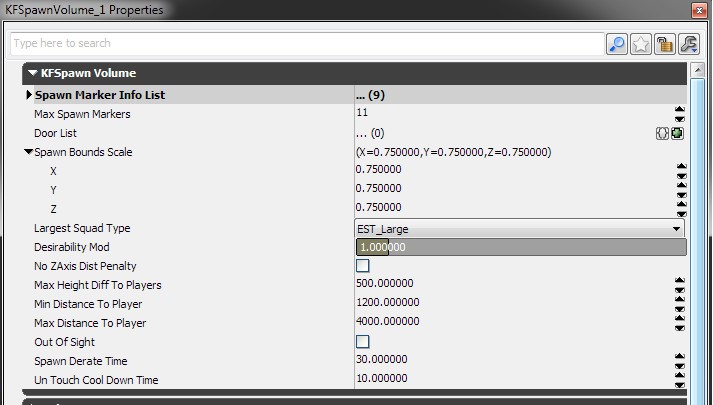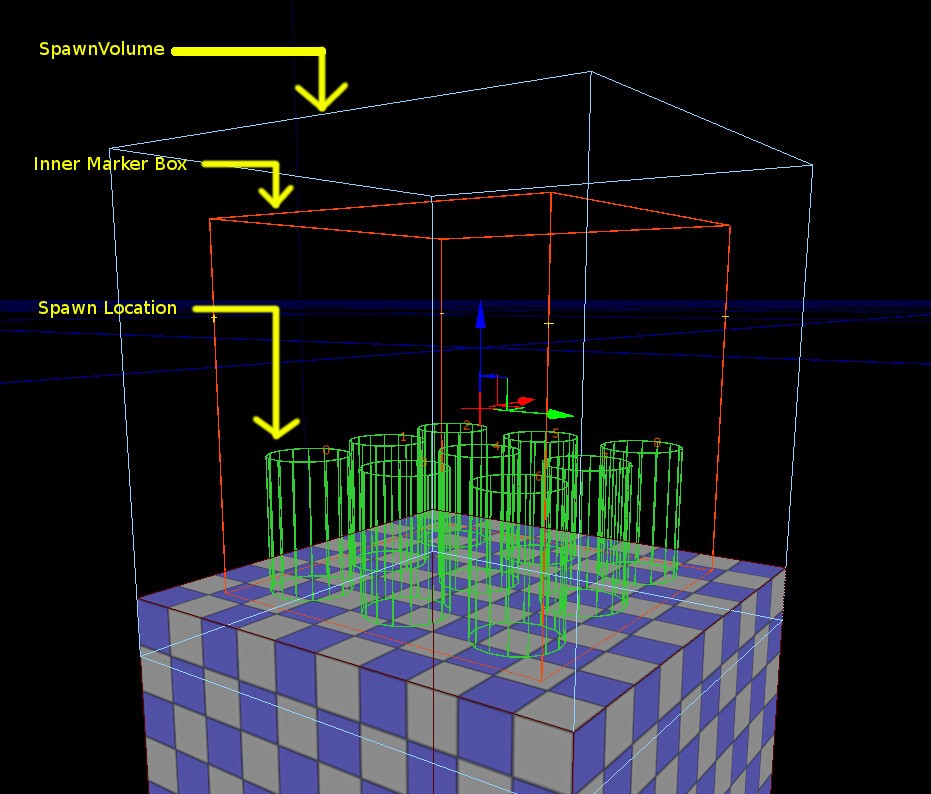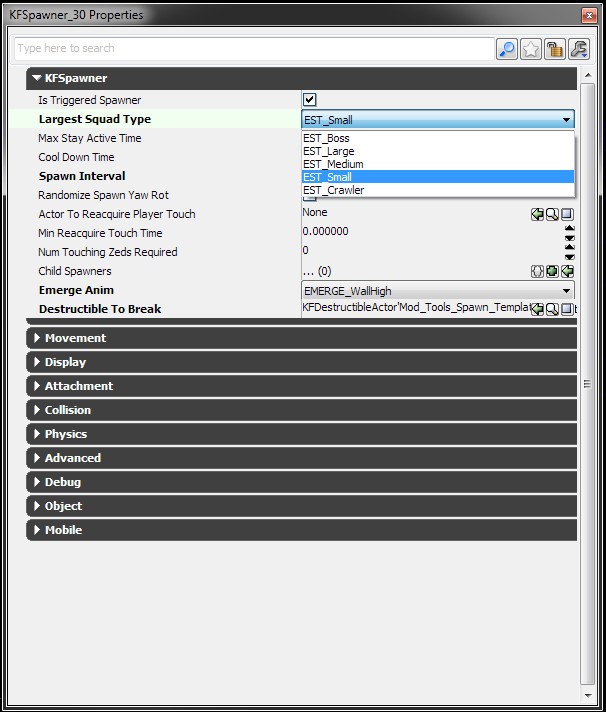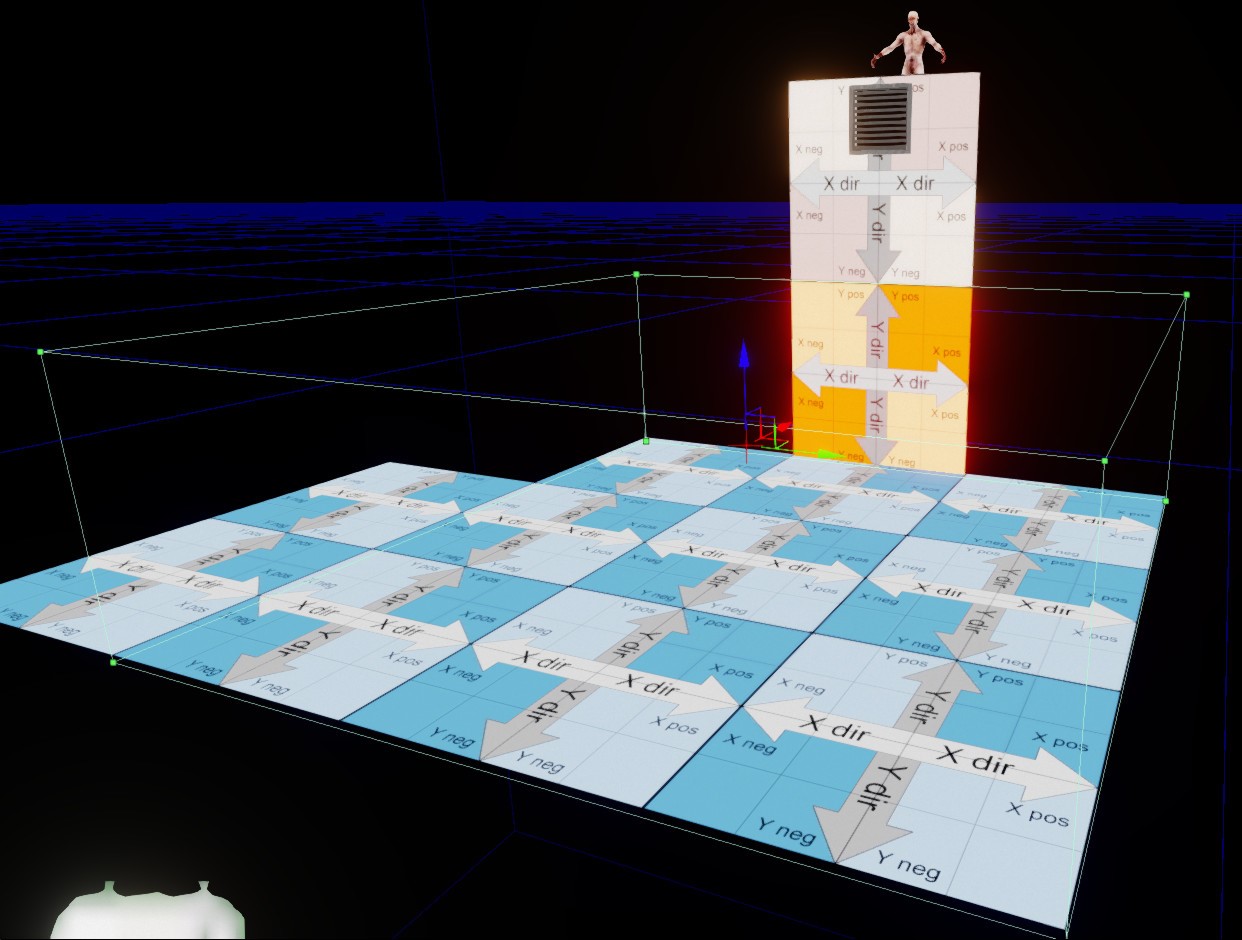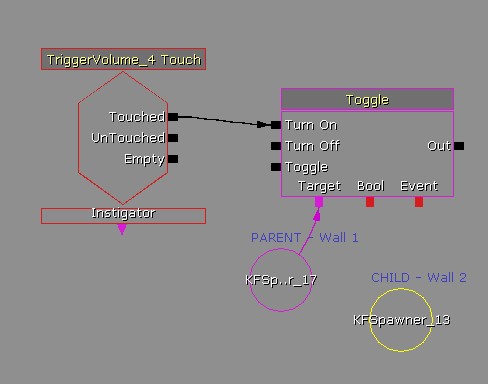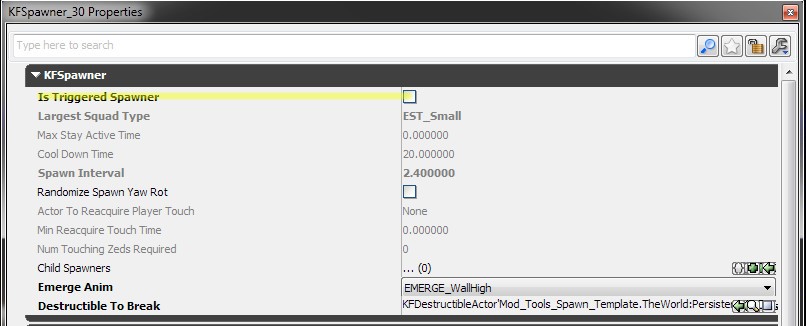Setting Up Spawns (Killing Floor 2)
Introduction
This document is meant to be used to get an understanding of the particular settings for the maps for Killing Floor 2.
KFSpawnVolume
Use the builder brush to make the volume. The pivot of the brush will be used to define where the inner marker box will be made from. Within the inner marker box, the spawn location visualizers will be placed. As a rule of thumb, we use 640x640 volumes to start with. We then adjust the pivot to be in the correct place so that the inner marker box will be drawn where we expect to. We then, typically, oversize the volume to allow for the players to be able to touch the volume when they are passing through a particular area. The touching of the player(s) will shut off the volume from being used.
Spawn Marker Info List: a list of spawn points inside the volume that is autogenerated
Max Spawn Markers: how many markers to use in a particular volume
Door List: what doors that this volume is associated with (See below for more info on door lists)
Spawn Bounds Scale: A scalar value that allows for increasing/decreasing the size of the inner marker box. (1.0 is full size)
Largest Squad Type: the largest type of Zed that will come through this volume. It will select the largest and anything smaller than it, when the spawning system decides where the Zed will be spawned.
EST_Crawler: crawlers only
EST_Small: crawlers, clots, and stalkers
EST_Medium: gorefast, siren, bloat
EST_Large: scrake, fleshpound
EST_Boss: Boss sized (used in Boss Spawning Volumes)
Desirability Mod: a percentile value of how likely a particular volume will be added to the selection list. Small adjustments go a long way
No Zaxis Dist Penalty: a bit that disables using Max Height to Players as part of the selection process for this particular volume. This is usually used when you have an elevated spawn location that the player cannot get to
Max Height Diff to Players: An unreal unit based measurement as to how far this volume can be from the players on the Z axis before it will loose desirability
Min Distance to Player: An unreal unit based measurement as to how close the player can be to this volume before the volume will loose desirability
Max Distance to Player: An unreal unit based measurement as to how far away the player can be from this volume before the volume will loose desirability
Out of Sight: a bit that tells the engine that the spawn is out of sight and no visibility testing will be used when the spawning system selects volume potentials
Spawn Derate Time: The amount of time that must pass before this volume will be considered by the spawning system
Un Touch Cool Down Time: How much time must pass before this volume will reactivate after a human player touches it
KFSpawner
The KFSpawner is a specialty spawn tool that is used to have Zed emerge from floors (sewers), walls and ceilings (air vents). They have special animations associated with them and have to set up very deliberately with very little lateral as to their alternative use.
SDK Map that contains fully configured KFSpawners
..\Content\Maps\SDK\Mod_Tools_Spawn_Template.kfm
The SDK map has all types of KFSpawners set up with associated TriggerVolumes. From a practical setup standpoint, you should just have to copy and paste it into your map, and rotate it to the appropriate direction. There are four types: high wall, low wall, floor and ceiling.
Properties
Is Triggered Spawner: A bit to tell the game if a particular KFSpawner is to be controlled by a trigger or if it's a child (uncheck the bit if it's a child spawner)
Largest Squad Type: This should always be set to EST_Small unless something changes in the future
Max Stay Active Time: The maximum amount time, in seconds, that the spawner can be used. A value >0 will only use the spawner for the defined time then it will become inactive
Cool Down Time: How long, in seconds, the KFSpawner will go inactive before it can be used again
Spawn Interval: How often the Zed will emerge from the portal entry when it's active
Actor To Reacquire Player Touch: The trigger volume associated with the KFSpawner will be used to track if players are still in the area and that it should be used (used in conjunction with Min Reacquire Touch Time)
Min Reacquire Touch Time: How long the player(s) must be in the area before the KFSpawner becomes active
Num Touching Zed Required: How many Zed must be in the area before the KFSpawner becomes active
Child Spawners: Array of associated KFSpawners that will be used in conjunction with the “Parent”. When the KFSpawner “Parent” activates, it will distribute the Zed to the children
Emerge Anim: The animation set that will be used with the KFSpawner (Emerge_HighWall, Emerge_LowWall, Emerge_Floor, Emerge_Ceiling)
Destructible To Break: The associated KFDestructible that will be “broken” when the Zed emerge from the KFSpawner
TriggerVolume Requirements
A TriggerVolume has to be made from the builder brush that encompasses the space that any particular KFSpawner is going to be used in. The reason for this is that the TriggerVolume is used to trigger the KFSpawner active (See Kismet requirements) as well as being used to track that a player is in the area that KFSpawner is going to be used in.
Kismet Requirements
Child Spawner Details
All the details about a child KFSpawner is inherited from the Parent. To make a child spawner work correctly, it must have the Is Triggered Spawner unchecked and be in the Child Spawner array of the parent.
Boss Volumes
A Boss Volume is simply a typical KFSpawnVolume with the largest zed type set to Boss. The volume must have at least 4 spawn markers in it. The volume, also, must be in a place where a cinematic camera can operate appropriately.
| |||||||||||||||||||
